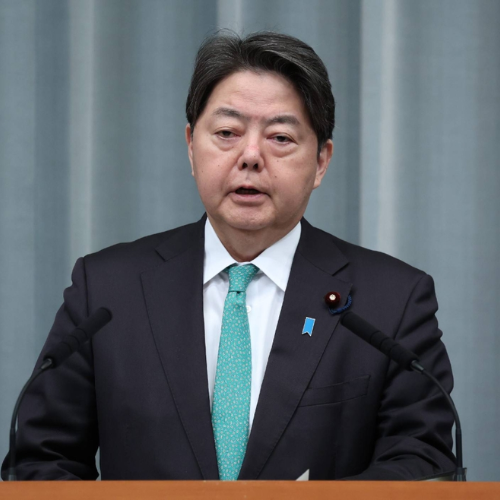On Friday, Japan announced a significant expansion of sanctions against Russia in response to its invasion of Ukraine. This move is part of an international effort to increase pressure on Russia and stop the ongoing conflict. Japan’s government is freezing the assets of individuals and organizations tied to Russia, implementing export bans on specific goods, and targeting countries that are allegedly helping Moscow evade sanctions.
Chief Cabinet Secretary Yoshimasa Hayashi explained the measures were aimed at contributing to global peace efforts. He also highlighted Japan’s cooperation with the international community, particularly its partners in the Group of Seven (G7), which has been united in condemning Russia’s actions.
Sanctions: The Who and the What
The Japanese government has added 33 organizations and 12 individuals to its list of asset freeze targets under the foreign exchange and foreign trade law. This means these individuals and organizations will no longer be able to access any assets they hold in Japan. Among the newly sanctioned individuals is one North Korean national, which suggests a focus on stopping North Korea’s suspected support for Russia.
Disney and Sony’s £13.5 Million Windfall from Russia Raises Eyebrows
In addition to freezing assets, Japan has imposed new export bans on 53 organizations from countries such as Russia and China. These organizations are suspected of providing Russia with goods and technologies that could strengthen its military or help it navigate around international sanctions. By targeting these entities, Japan aims to disrupt Russia’s ability to sustain its military operations in Ukraine.
Perhaps the most sweeping measure is Japan’s decision to ban the export of 335 additional goods to Russia. This includes small motorcycles, specialized vehicle components like crane parts, and other critical items. Starting January 23, these goods can no longer be sold to Russia by Japanese companies. The move seeks to block Russia’s access to items that may be used for military or industrial purposes.
A Broader Focus: Closing the Loopholes
Japan’s expanded sanctions reflect growing concerns over Russia’s use of third countries to bypass international penalties. Reports suggest that North Korea and other nations have been helping Russia obtain goods and resources that would otherwise be unavailable due to global sanctions. By targeting these third-party organizations, Japan hopes to close the loopholes that weaken the impact of international measures.
The sanctions also align with Japan’s broader foreign policy objectives. As a member of the G7, Japan has consistently condemned Russia’s actions and joined global calls for peace. These new measures emphasize Japan’s commitment to working alongside other nations to isolate Russia economically and diplomatically.
The sanctions are a direct response to the situation in Ukraine, where Russia’s invasion has led to significant destruction and loss of life. By expanding its penalties, Japan joins the global push to cut off financial and material support for Russia, making it harder for Moscow to continue its military aggression.
Poland’s EU Presidency: Strengthening Ukraine, Challenging Russia
Japan’s sanctions also send a strong signal to other nations. By targeting organizations from multiple countries, Japan demonstrates that it is willing to act decisively against anyone supporting Russia’s actions, either directly or indirectly.
A United Front for Peace
These expanded measures underline Japan’s commitment to playing a significant role in global efforts to end the conflict in Ukraine. The sanctions target key areas—financial assets, export goods, and third-party support—to increase pressure on Moscow. Japan’s actions are part of a broader global movement to hold Russia accountable and to stop its aggressive actions in Ukraine.
Through these sanctions, Japan is not only standing in solidarity with Ukraine but also reinforcing its position as a key player in the international response to the crisis. The measures highlight Japan’s determination to ensure that peace and stability remain priorities in the region and beyond.
By focusing on asset freezes, export bans, and curbing third-party support, Japan’s expanded sanctions show its firm stance against any attempts to prolong the conflict or evade global penalties. These steps, starting later this month, represent a critical part of the international community’s efforts to bring peace to Ukraine and pressure Russia to end its invasion.


